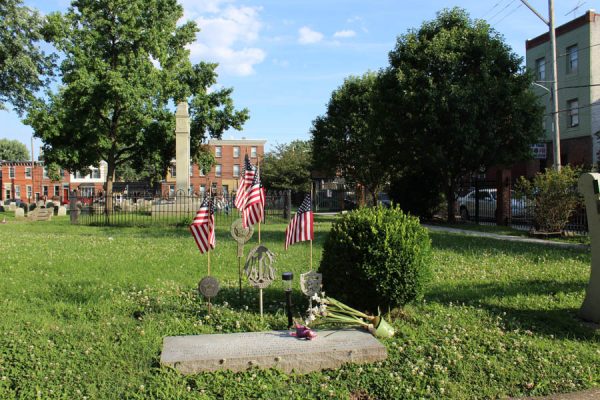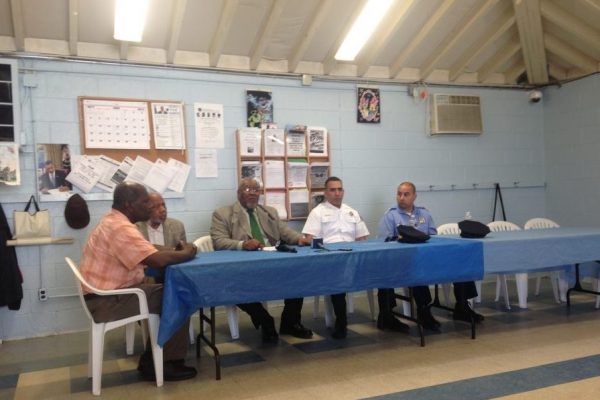City Council Pres. Clarke Discusses Education, Municipal Pensions at FNA Meeting
As tensions mount between City Hall and Harrisburg with regards to Philadelphia’s $5 billion unfunded pension liability and struggling (read: stumbling) school district, City Council President Darrell Clarke stopped by the Fishtown Neighbors Association’s general assembly meeting on Thurs., May 15 to explain his new plans on how to approach and fix these serious issues.
At the meeting, Clarke explained his push for an extension to Philadelphia’s 1 percent sales tax increase that is set to expire on June 30, 2014. Clarke’s proposed plan would send almost all of the tax’s expected revenue next year (what the City Council President described as $120 million) to the school district. Then over the course of a few years, revenues generated from the additional sales tax would begin to go toward the city’s pension fund, steadily increasing until there is a 50/50 split in tax revenue between the school district and pensions.
Clarke believes he is issuing a compromise to Harrisburg with this plan— last year Governor Tom Corbett offered a deal that would send the first $120 million in sales tax revenue to Philadelphia’s school district and whatever was left to pensions. Clarke, who originally wanted the 50/50 split right off the bat prior to settling for this graduated approach, believes that fixing the pension problem is paramount.
“A lot of people say, ‘the pension problem is for municipal employees. If I’m not a municipal employee, I don’t have family members who are municipal employees, why should I care,’” Clarke said. “First of all, the simple reality is that if someone has worked for the municipality for 30 years and have been paying into the pension all their life, it’s important to give them what they are entitled to when they retire. It’s the fair and right thing to do since they have been promised a pension.”
Clarke also believes that addressing the pension deficit should be a primary concern in order to avoid service “brown outs” as pensions continue to drain on other city services like fire stations and money for recreation centers.
While adamant on the importance of balancing municipal pensions, Clarke mentioned other ways to increase funding to the school district including a proposed $2 tax on each pack of cigarettes. This revenue would go directly to the schools once returns from the sales tax extension begin to shift toward making up the pension deficit.
The City Council President believes that because of the state’s $1.1 billion deficit, GOP-controlled Harrisburg will be more inclined to vote in favor of something that will raise revenues (Clarke estimates cigarette tax revenues in the ballpark of $85-90 million) even if it means more taxes. However, if Clarke’s plan goes nowhere, the city’s sales-tax increase will expire on the first of July and the district will miss out on the money that it sorely needs to dig itself out of the ever-growing hole it has found itself in. In short— this could be all or nothing.
“We’re hoping that as a result of this newfound leverage that we will be in position to get this cigarette tax too,” Clarke said. “If we don’t then we can’t have the split that we proposed [between education and pension relief]. But at the end of the day, we are going to put more money into schools, we just simply have to because there’s nothing more important than the education of our young people. And not just for their own purposes but for the city of Philadelphia.”
After Clarke explained his plans, he opened the meeting up to the FNA members in attendance. One resident brought up how the dedicated funding base for the school district is real estate tax. She asked what was being done to people who don’t pay their real estate taxes.
Last year saw many property values and real estate taxes increase under the Actual Value Initiative’s tax reassessments. In light of this, the city has been hard pressed to find delinquent taxpayers and collect. When a property becomes delinquent, the city first mails a warning to the property’s owner. After the warning, the city will put a lien on the property. This lien prevents the property owner from selling the property and collecting the profits with out paying what is already owed to the city.
Problems arise when delinquent property owners do not live in the building or even in the city. Originally, the law was written in a way that made it difficult to collect a lien on an investment property and not the investor’s primary residence. According to Clarke, that’s all changed now.
“We actually got the state to allow us to change the law so now the delinquency on vacant properties can be imposed on the occupied properties— the properties that are producing revenue and [a delinquent tax payer’s] own home,” Clarke explained.
That means people who live outside the city who refuse to pay real estate taxes will now be forced to pay. In addition, Clarke also mentioned selling liens to collections services.
“From what I’ve been told by people in New Jersey who have been under contract over there, they’ve seen 96 percent success rate [in collections],” he said. “So we are looking very seriously at going in that direction.”
Because new tax legislation is never a sure thing, another resident asked whether City Council has a Plan B if the cigarette tax doesn’t get passed in Harrisburg for ongoing funding for schools.
“Plan B always comes up at the 11th hour and at the 11th hour people always figure out what Plan B is. But you have to believe in what you’re trying to do—I don’t like having a pessimistic attitude. I’m actually an optimist, I think we can do stuff. And I may be crazy but it’s just the way I am,” Clarke said. “There’s going to be a Plan B if we are not successful and there are some other options out there. But I just think that if we can’t do this now then we’ll never get it.”







